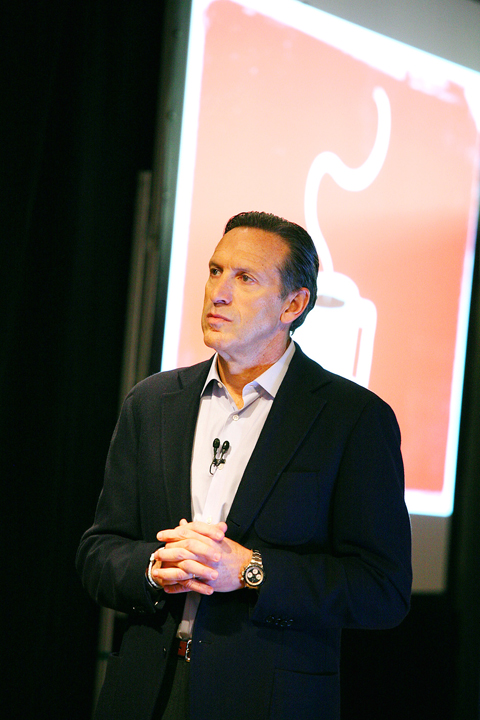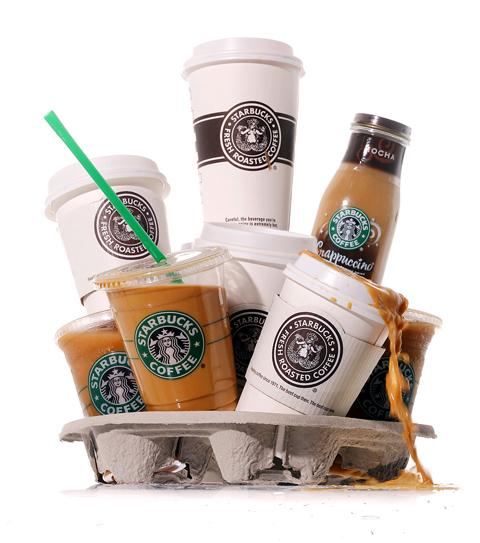The Frappuccino king truly knows how to talk. Starbucks chairman Howard Schultz is dear friends with Rwanda’s president, has a close relationship with the prime minister of Ethiopia and had a grandfather from Manchester, England.
Perched on a leather sofa in a Seattle conference hall, Schultz’s conversation hops around the world as he discusses ethical sourcing, quality roasting and the “unparalleled” standards of freshness in Starbucks’ coffee beans.
The tall, wiry, 55-year-old Brooklyn-born tycoon is on a charm offensive. His chain of 16,680 stores is going through the toughest patch of its 38-year history as caffeine-seekers feel the pinch from straitened economic conditions. Schultz, who built the global empire from just a handful of branches in Washington state, feels misunderstood.

PHOTO: NY TIMES NEWS SERVICE
He complains that Starbucks, which has seen its share price plunge by two-thirds in two years, has unfairly been labeled a “poster child for excess” by critics, who see its creamy Frappuccinos and white chocolate mochas as a symbol of boom-time folly.
“There’s this myth that has been exacerbated by others that Starbucks means a US$4 cup of coffee, which is not true,” he says, ticking off a list of Starbucks’ cheaper, down-menu drinks.
“We have been relatively silent about how we’ve been positioned. It’s not going to remain like that,” he says. “We will be more aggressive.”

PHOTO: NY TIMES NEWS SERVICE
Starbucks’ profits dived by 53 percent to US$315 million in the year to September. For the first quarter of its fiscal year, earnings fell even further, slumping 69 percent. In the last year, the firm has announced more than 10,000 job cuts and nearly 1,000 store closures, including two-thirds of its chain in Australia.
Schultz, who returned as chief executive last year after taking a back seat as chairman, is trying to revive the “theater” of Starbucks branches. New coffee machines are lower, giving customers a better view of baristas making their drinks. Smelly sandwiches are out, to restore the aroma of coffee beans, and refurbishments are planned to give stores a locally themed and less uniform look with recycled materials, vintage coffee crates and funky lighting.
Reluctantly and slightly defensively, Schultz admits that Starbucks expanded too fast in the good times.
“We have had a cataclysmic financial crisis, the likes of which no one has seen before,” he says. “If we had a crystal ball about where the economy was going, I’m sure we wouldn’t have made certain decisions.”
Early last year, Starbucks had a long-term ambition of expanding to 30,000 stores globally. That appears to have gone by the wayside.
“I don’t think it would be responsible to look at the total number of stores as a specific goal,” he says.
Starbucks will launch a brand of instant coffee, Via, at its 747 stores in Britain and Ireland next week, in Seattle and Chicago this month before rolling it out to all of its US stores in the fall. The granules will be in sachets for use at home and, Schultz says, are the product of a patented, high-tech method of retaining flavor, which differs from that used by Maxwell House, Kenco or Nescafe.
“The worldwide [instant coffee] category is US$17 billion and most of the coffee, candidly, isn’t very good,” says Schultz, who told shareholders at Starbucks’ annual meeting last week that dinner party guests and even his own wife couldn’t tell the difference when he served them Via.
Brought up on a down-at-heel New York housing estate, Schultz cut his teeth in the business world as a Xerox salesman before joining a Swedish kitchenware company, Hammarplast. One of Hammarplast’s clients for upmarket coffee-makers was a tiny Seattle firm, Starbucks, which had a handful of outlets selling coffee beans and teas. Schultz was impressed by its coffee and joined the company in 1982, before buying it in 1987. He cites a 1983 visit to an espresso bar in Milan as his inspiration for taking the “theater” of genuine coffee-making to the masses.
Schultz comes from humble beginnings — his father, Fred, drifted through jobs as a taxi driver, factory worker and truck driver.
“He was an uneducated man, a war veteran, and unfortunately he never quite got his piece of the American dream. I’ve always wanted to try to build the kind of company my father never got a chance to work for,” Schultz says, citing healthcare benefits and share options for Starbucks’ part-time workers — although he has faced criticism for discouraging US unions on the grounds that they are “unnecessary.”
Starbucks’ effort to revive its fortunes will play heavily on what Schultz sees as its ethical strengths. All of the espresso-based coffee used in its European stores is Fairtrade certified. The company’s charitable efforts extended to mobilizing thousands of employees to help rebuild hurricane-savaged New Orleans last year. Trying to tap into the zeitgeist, the firm offered a free coffee to anybody who voted on US election day.
“Even though people are under economic pressure, they still want to support those brands with values that are compatible with their own,” says Schultz, who professes to be perplexed that Starbucks is targeted by a “vocal minority” of anti-capitalist protesters.
A four to five-cups-a-day man, Schultz still seems to retain his passion for coffee which, at one point, made him a billionaire — although his wealth has dropped back into millionaire territory since Starbucks’ fortunes dipped.
Starbucks, says Schultz, has a barometer of the economic mood in its minute-by-minute coffee sales.
“Every day we can see levels of consumer confidence around the world because we’ve got stores in 50 countries,” he says.
Not averse to enjoying life, Schultz faced flak for using Starbucks’ brand-new US$45 million corporate jet in January for a holiday in Hawaii, where he rubbed shoulders with the cyclist Lance Armstrong. Schultz footed the bill and the jet has since been put up for sale.
“I never wanted to be on any billionaires list,” he says. “I never define myself by net worth. I always try to define myself by my values.”
Warming up for another discussion of coffee-buying ethics in developing countries, he continues: “My mother taught me something at a young age — she said ‘you are the company you keep.’ To define yourself by some label or some level of resources — that’s pretty shallow.”

The CIA has a message for Chinese government officials worried about their place in Chinese President Xi Jinping’s (習近平) government: Come work with us. The agency released two Mandarin-language videos on social media on Thursday inviting disgruntled officials to contact the CIA. The recruitment videos posted on YouTube and X racked up more than 5 million views combined in their first day. The outreach comes as CIA Director John Ratcliffe has vowed to boost the agency’s use of intelligence from human sources and its focus on China, which has recently targeted US officials with its own espionage operations. The videos are “aimed at

STEADFAST FRIEND: The bills encourage increased Taiwan-US engagement and address China’s distortion of UN Resolution 2758 to isolate Taiwan internationally The Presidential Office yesterday thanked the US House of Representatives for unanimously passing two Taiwan-related bills highlighting its solid support for Taiwan’s democracy and global participation, and for deepening bilateral relations. One of the bills, the Taiwan Assurance Implementation Act, requires the US Department of State to periodically review its guidelines for engagement with Taiwan, and report to the US Congress on the guidelines and plans to lift self-imposed limitations on US-Taiwan engagement. The other bill is the Taiwan International Solidarity Act, which clarifies that UN Resolution 2758 does not address the issue of the representation of Taiwan or its people in

US Indo-Pacific Commander Admiral Samuel Paparo on Friday expressed concern over the rate at which China is diversifying its military exercises, the Financial Times (FT) reported on Saturday. “The rates of change on the depth and breadth of their exercises is the one non-linear effect that I’ve seen in the last year that wakes me up at night or keeps me up at night,” Paparo was quoted by FT as saying while attending the annual Sedona Forum at the McCain Institute in Arizona. Paparo also expressed concern over the speed with which China was expanding its military. While the US

SHIFT: Taiwan’s better-than-expected first-quarter GDP and signs of weakness in the US have driven global capital back to emerging markets, the central bank head said The central bank yesterday blamed market speculation for the steep rise in the local currency, and urged exporters and financial institutions to stay calm and stop panic sell-offs to avoid hurting their own profitability. The nation’s top monetary policymaker said that it would step in, if necessary, to maintain order and stability in the foreign exchange market. The remarks came as the NT dollar yesterday closed up NT$0.919 to NT$30.145 against the US dollar in Taipei trading, after rising as high as NT$29.59 in intraday trading. The local currency has surged 5.85 percent against the greenback over the past two sessions, central